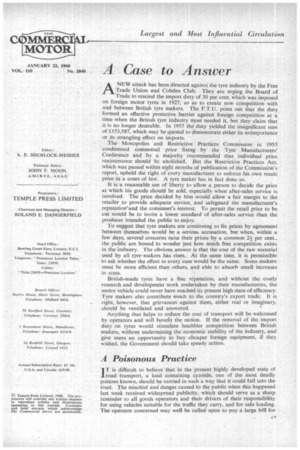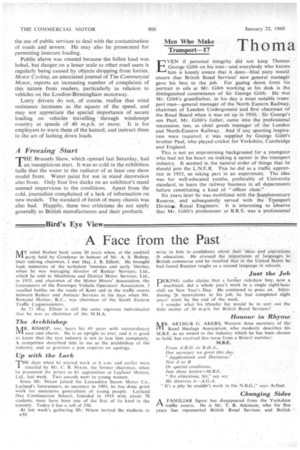A Case to Answer
Page 47

Page 48

If you've noticed an error in this article please click here to report it so we can fix it.
ANEW attack has been directed against the tyre industry by the Free Trade Union and Cobden Club. They are urging the Board of Trade to rescind the import duty of 30 per cent. which was imposed on foreign motor tyres in 1927, so as to create new competition with and between British tyremakers. The F.T.U. point out that the duty formed an effective protective barrier against foreign competition at a time when the British tyre industry most needed it, but they claim that it is no longer desirable. In 1957 the duty yielded the insignificant sum of £153,587, which may be quoted to demonstrate either its unimportance or its strangling effect on imports. The Monopolies and Restrictive Practices Commission in 1955 condemned communal price fixing by the Tyre Manufacturers' Conference and by a majority recommended that individual price maintenance should be abolished. But the Restrictive Practices Act, which was passed within eight months of publication of the Commission's report, upheld the right of every manufacturer to enforce his own resale price in a court of law. A tyre maker has in fact done so. It is a reasonable use of liberty to allow a person to decide the price at which his goods should be sold, especially when after-sales service is involved. The price decided by him would allow a fair margin to the retailer to provide adequate service, and safeguard the manufacturer's reputation-and the consumer's interest. To permit the retail price to be cut would be to invite a lower standard of after-sales service than the producer intended the public to enjoy. To suggest that tyre makers are continuing to fix prices by agreement between themselves would be a serious accusation, but when, within a few days, several concerns raise their prices by a common 21 per cent., the public are bound to wonder just how much free competition exists in the industry. The obvious answer is that the cost of the raw material used by all tyre-makers has risen. At the same time, it is permissible to ask whether the effect in every case would be the same. Some makers must be more efficient than others, and able to absorb small increases in costs. British-made tyres have a fine reputation, and without the, costly research and development work undertaken by their manufacturers, the motor vehicle could never have reached its present high state of efficiency. Tyre makers also contribute much to the country's export trade.It is right, however, that grievances against them, either real or imaginary, should be ventilated and answered. Anything that helps to reduce the cost of transport will be welcomed by operators and will benefit the nation. If the removal of the import duty on tyres would stimulate healthier competition between British makers, without undermining the economic stability of the industry, and give users an opportunity to buy cheaper foreign equipment, if they wished, the Government should take speedy action.
A Poisonous Practice
IT is difficult to believe that in the present highly developed state of road transport, a load containing cyanide, one of the most deadly poisons known, should be carried in such a way that it could fall into the road. The mischief and danger caused to the public when this happened last week received widespread publicity, which should serve as a sharp reminder to all goods operators and their drivers of their responsibility for using vehicles suitable for the traffic they carry, and for safe loading. The operator concerned may well be called upon to pay a large bill for the use of public services to deal with the contamination of roads and sewers, He may also be prosecuted for permitting insecure loading.
Public alarm was created because the fallen load was lethal, but danger on a lesser scale to other road users is regularly being caused by objects dropping from lorries. Motor Cycling, an associated journal of The Commercial Motor, reports an increasing number of complaints of• this nature from :readers, particularly in relation to vehicles on the London-Birmingham motorway.
Lorry drivers do not, of course, realize that wind resistance increases as the square of the speed, and may not appreciate the special importance of secure loading on vehicles travelling through windswept country at speeds of 40 m.p.h. or more. It is for employers to warn them of the hazard, and instruct them in the art of lashing down loads.
A Freezing Start
rTHE Brussels Show, which opened last Saturday, had I an inauspicious start. It was so cold in the exhibition halls that the water in the radiator of at least one show model froze, Water paint for use in stand decoration also froze. Only four live ducks on an exhibitor's stand seemed impervious to the conditions. Apart from the cold, journalists complained of a lack of information on new models. The standard of finish of many chassis was also bad. Happily, these two criticisms do not apply generally to British manufacturers and their products.












































































































































